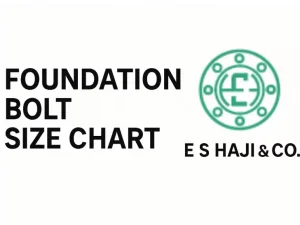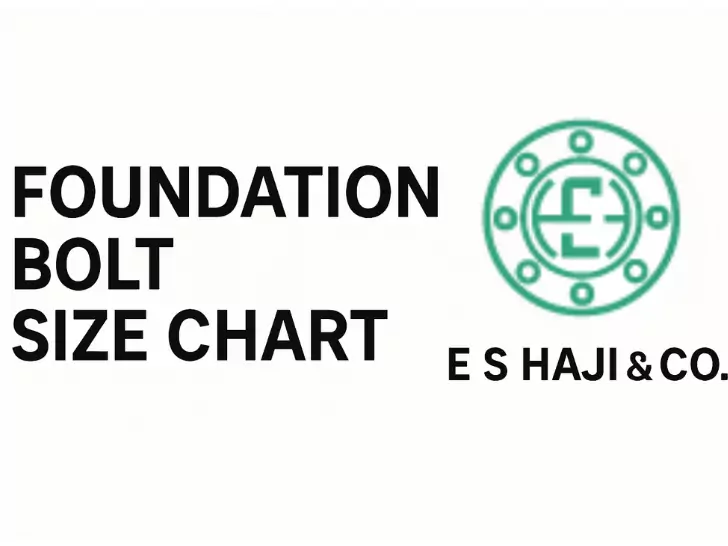Foundation Bolt Size Chart – E S HAJI & CO.
Foundation bolts play a crucial role in ensuring the structural stability and durability of various constructions and machinery installations. Whether you’re anchoring steel structures, heavy machinery, or load-bearing parts, selecting the correct foundation bolt size is essential for safety and efficiency. We will provide an in-depth understanding of foundation bolts, their sizes, applications, and materials, and will feature an easy-to-use foundation bolt size chart by E S HAJI & CO.
What is a Foundation Bolt?
A foundation bolt is a specialized fastener used to anchor heavy equipment and structures securely to concrete foundations. These bolts are designed to provide long-term strength and resistance to vibration and external forces. Designed in various shapes, sizes, and materials, foundation bolts ensure the safety and stability of critical infrastructure, including industrial machinery, steel columns, and other load-bearing structures.
Types of Foundation Bolts
There are several types of foundation bolts to suit different applications:
- J-Type Foundation Bolts: These are shaped like the letter “J” and provide excellent anchoring strength in concrete.
- L-Type Foundation Bolts: Similar to J-type bolts but shaped like the letter “L,” suitable for lighter applications.
- Straight Foundation Bolts: These bolts come with nuts and washers and are used for precision anchoring.
- Bent Foundation Bolts: Designed for specific engineering requirements, offering customization in design.
Common Applications of Foundation Bolts
Foundation bolts are versatile fasteners used across various industries, including:
- Industrial Machinery: Securely fixing heavy equipment to prevent movement or vibration.
- Construction Projects: Providing structural stability to buildings and steel frameworks.
- Power Plants and Oil Rigs: Anchoring heavy loads in high-stress environments.
- Telecommunications Towers and Bridges: Improving safety and durability in load-bearing structures.
Standard Foundation Bolt Sizes
Foundation bolts come in a wide range of sizes to cater to different needs. The size of the bolt depends on factors such as load capacity, depth of embedment, and the strength of the material used. Standard sizes are often defined in millimeters (mm), inches, or customized to meet specific engineering requirements.
Examples of Common Sizes
- M24 Foundation Bolt Dimensions: A popular size for medium to heavy-duty applications.
- Anchor Bolt Standard Sizes in mm: Conforms to specific industry standards, ensuring compatibility and reliability.
- J-Type Foundation Bolt Dimensions: Customized sizes used for specific structural requirements.
Foundation Bolt Size Chart
Below is a detailed size chart provided by E S HAJI & CO. This chart includes key dimensions to ensure you select the correct foundation bolt size for your project. For a downloadable version, refer to our foundation bolt size chart PDF.
| Bolt Size | Length (mm) | Thread Diameter (mm) | Weight (kg) |
|---|---|---|---|
| M16 | 100-300 | 16 |
|
| M20 | 150-500 | 20 |
|
| M24 | 200-800 | 24 |
|
| M30 | 300-1000 | 30 |
|
| M36 | 400-1500 | 36 |
|
For a more comprehensive guide, including J-type foundation bolt dimensions, steel foundation bolt size chart, and L-type foundation bolt weight chart, consider using the foundation bolt weight calculator provided by E S HAJI & CO.
Factors to Consider When Choosing a Foundation Bolt Size
Selecting the right foundation bolt goes beyond size. Here are some important factors to consider:
- Load Capacity: Ensure the bolt can handle the required weight and stress.
- Material: Choose materials like steel or stainless steel for durability.
- Environmental Conditions: For outdoor use, opt for corrosion-resistant materials.
- Length and Embedment Depth: Ensure the bolt anchors securely into the concrete.
Materials Used in Foundation Bolts
Foundation bolts are manufactured from materials designed for strength and durability:
- Stainless Steel: Offers excellent corrosion resistance and strength.
- Carbon Steel: Commonly used for its high tensile strength.
- Galvanized Steel: Ideal for outdoor applications due to its rust-resistant coating.
These materials ensure the bolts meet the demands of various industries, providing both reliability and safety.
Installation Guidelines for Foundation Bolts
Proper installation is key to ensuring the effectiveness of foundation bolts. Follow these guidelines:
- Prepare the Site: Ensure the concrete foundation is clean and free of debris.
- Drill the Hole: Drill a hole to the specified diameter and depth for the bolt.
- Insert the Bolt: Position the bolt correctly and secure it with cement or epoxy.
- Allow Curing Time: Ensure sufficient curing time based on the adhesive or concrete used.
- Perform a Final Check: Inspect the installation for alignment and proper tightening.
For best results, consult the manufacturer’s installation manual or E S HAJI & CO.’s expert guide.
Elevate Your Projects with the Right Foundation Bolts
Choosing the correct foundation bolt size and type is critical for the safety and longevity of your projects. With E S HAJI & CO. comprehensive range of bolts, you can ensure your construction meets the highest industry standards. Download our foundation bolt size chart PDF or explore our range to find the perfect fit for your needs.
Are you ready to make your next project stronger and more secure? Contact E S HAJI & CO. for further assistance or download our foundation bolt size chart in mm to get started.
Foundation Bolt Size Chart

Discover the ultimate guide to foundation bolts with our comprehensive size chart in mm. Learn about standard dimensions, materials, and their applications in construction and engineering. Rely on E S HAJI & CO. for expert advice and quality products to ensure your projects are secure and efficient.
Product Brand: E S HAJI And CO
Product Currency: INR
Product In-Stock: InStock
5

